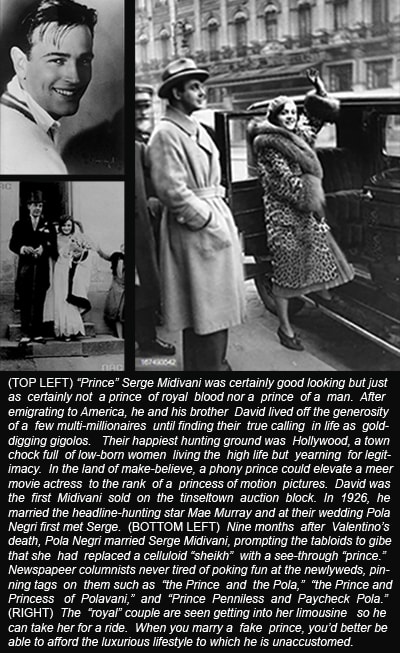Hotel Imperial (1927)
Legendary star Pola Negri in a World War I drama of espionage, heroism and romance--a silent super- production revitalized with synchronized symphonic music, digital image enhancement, original title cards reproduction, a new opening titles sequence, a new Gallician history montage sequence and new World War One battle sequences.
The purpose behind making Hotel Imperial was to boost the sagging popularity of Pola Negri. Polish born and formerly the greatest female star in German cinema, she had dazzled American film audiences with her image as the glamorous, passionate, worldly femme fatale in a stringof romantic melodramas for Paramount Pictures since 1922. Now, five years into the game of fantastic--and usually fake--publicity stories and rehashed formula film vehicles, the public was growing weary of Pola and bored by her films.
Making matters worse for her film career was her personal life--which was certainly not private. Negri's high-profile love affair with the original Latin lover of the movies, Rudolph Valentino, had initially thrilled their fans and had become serious enough that stories claiming they were engaged to be married began appearing in newspapers around the world. When Valentino died suddenly of peritonitis in 1926, millions of people felt a deep, personal loss and mourned him reverently.
If it was for publicity, it certainly succeeded. Negri's name and face were unavoidable, plastered on newspaper front pages and magazine covers everywhere. But was it all for publicity? Negri was no fool and must have known in advance what public reaction would be to her using Valentino's funeral for self promotion. For the rest of her life, Negri said Valentino was the love of her life and that, being Polish, her extreme and uncontrollable emotions were typical of Slavic people, who considered suppressing one's agonizing grief at a funeral to be shameful, contemptible behavior. She might just have been telling the truth about this--think of all the scenes on television news broadcasts in the 1990's during the wars in the Balkans, showing men and women screaming, tearing at their hair and, yes, fainting over the deaths of loved ones.
Negri drew more harsh criticism when, less than a year after Valentino's death, she suddenly married Serge Midivani. One of the so-called "marrying Midivanis," five siblings whose family had fled Russian Georgia during the Bolshevik revolution and relocated in the west. Though dirt poor, they cleverly gave themselves noble titles with which to attract rich, gullible women who dreamed of marrying Prince Charming. Serge Midivani overflowed with charm, was handsome and athletic, and gave himself the title of a prince. Negri may have been on the rebound from losing Valentino or smitten with Midivani's good looks or in love with the idea of becoming a "princess" but whatever her reasons for marrying Serge, public opinion said that her marriage to Serge Midivani was yet another publicity stunt which proved conclusively she had never loved Valentino.
Thus, in an attempt to regain public favor and revive box office revenue, Paramount replaced Negri's image as a beguiling vamp with that of a humble, down-to-earth maiden, pure of heart but still feisty and passionate. In Hotel Imperial she played Anna, a chambermaid at a small, rustic hotel in the Galician hinterlands. With unkempt hair, little makeup and dressed in ill-fitting rags, Anna swept floors, emptied dust bins, and secretly dreamed of romance. Anna was no better and no worse than the typical American girl who went to the movies twice a week.
For the movie-going American male, who had been drawn to Negri's films by the sin, flesh and sexual situations they inevitably contained, Paramount gave Hotel Imperial suspense, danger and action in a plot involving warfare, spies and heroism--plus the added attraction of Negri performing what amounted to a strip-tease in the climactic scene.
As would also be the case with Garbo and Dietrich during the sound era, Pola Negri's popularity in Europe remained strong throughout her silent film career and Paramount, in an effort to ensure or improve business for Hotel Imperial overseas, hired the great German producer Erich Pommer and the acclaimed Swedish director Mauritz Stiller to give the film a distinctly European atmosphere.
So watch the dynamic, sensational, and ever controversial international legend of the silent screen, Pola Negri, in one of the most pivotal films of her illustrious career, as Sounds of Silents presents the GCM Production of a MaxManLA Video, Hotel Imperial, revitalized with synchronized symphonic music, digital image enhancement, original title cards reproduction, a new opening titles sequence and new World War I battle montage sequences.
The link below offers FREE online viewing as well as several FREE downloading options.
LINK: HOTEL IMPERIAL (1927) with SYNCED MUSIC











